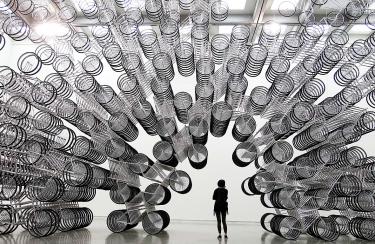 |
| Ai Wei Wei |
Ai Weiwei (艾未未), uno de los más renombrados artistas chinos y gran crítico del Gobierno, conocido, entre otros, por su diseño vanguardista del estadio olímpico de Pekín, continúa sus encontronazos con las autoridades. El artista, de 53 años, ha organizado una cangrejada el próximo domingo en Shanghái para celebrar la demolición de su estudio en la capital económica y financiera del país. Agasajará con vino y 10.000 cangrejos a quienes acudan al banquete. El número 10.000 tiene fuertes connotaciones políticas en China, ya que era utilizado en los eslóganes maoístas, mientras que cangrejo de río (hexie) se pronuncia en chino de forma parecida a armonía, el concepto que se ha convertido en el mantra del departamento de propaganda del Partido Comunista Chino (PCCh). En los blogs del país asiático, se dice que un mensaje ha sido "armonizado" para decir que ha sido censurado.
Ai asegura que fue invitado hace dos años a unirse al desarrollo de un nuevo barrio artístico en el norte de Shanghái, y que el Gobierno municipal ha declarado ahora el estudio ilegal. El artista cree que se trata de una trampa tendida por su activismo y sus continuadas críticas a los excesos gubernamentales.
Las autoridades afirman que el proyecto es ilegal y niegan que haya conexión entre la demolición y su disidencia. "El estudio de Ai no ha seguido los procedimientos pertinentes, por tanto, es un edificio ilegal", ha asegurado Chen Jie, director del departamento de urbanismo de Malu, donde se encuentra la construcción, en el periódico en inglés Global Times, ligado al Diario del Pueblo, órgano oficial del PCCh.
Ai Weiwei ha producido dos documentales sobre sendos casos muy controvertidos en Shanghái. Uno sobre Yang Jia, un joven que mató a cuchilladas a seis policías en una comisaría y fue ejecutado en 2008, en medio de acusaciones de abusos de la policía; y otro sobre Feng Zhenghu, un activista, que vive en Shanghái, a quien las autoridades negaron el permiso para regresar desde Japón a finales de 2009 y pasó más de tres meses en el aeropuerto de Narita, en Tokio.
 |
| Estadio Olímpico de Pekin |
El coste del estudio de Ai Weiwei, una vez completado -la decoración interior está aún en proceso-, ronda un millón de dólares. El artista tiene otro estudio en Pekín, donde vive, en una zona también amenazada de demolición. Ai diseñó el estadio nacional, conocido como el Nido de Pájaro, pero, después, criticó su utilización propagandística y se negó a asistir a la inauguración de los JJ OO. Es uno de los pocos artistas chinos que expresa de forma abierta su oposición al Gobierno, y ha convertido, con ironía, sus choques con las autoridades en el corazón de parte de su creación artística, bajo riesgo de acabar en prisión. Actualmente, tiene una gigantesca instalación en la galería Tate Modern, en Londres, en la que exhibe 100 millones de pipas de girasol de porcelana pintadas a mano.









